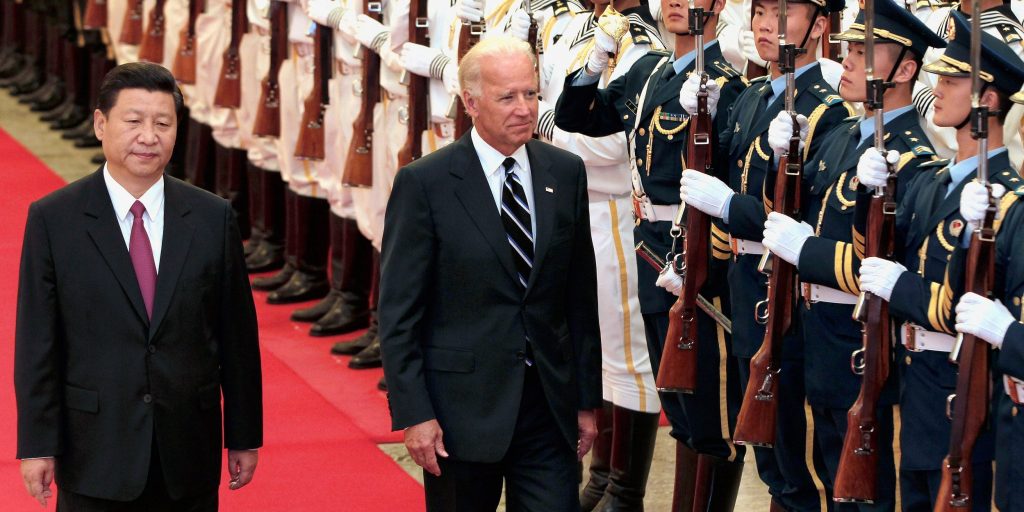- China's slowing economic growth and supply-chain challenges have impacted the US economy.
- US-China tensions have risen amid news House Speaker Pelosi will visit Taiwan.
- These economic and national security challenges could rival international focus on Russia and Ukraine.
The US economy is already struggling as new GDP data shows multiple quarters of contraction. But it could face further pressure as developments in China — a familiar economic foe — threaten to spill over globally.
A few weeks ago, China reported GDP growth of 0.4% in the second quarter, falling short of the 1% projected by analysts polled by Reuters. It was the worst report since the country reported a 6.8% contraction in the first quarter of 2020 as it began battling the pandemic.
Additionally, House Speaker Nancy Pelosi just landed in Taiwan as part of her Asian tour, the highest-ranking US official to visit the island nation in 25 years. This has escalated tensions between the US and China, which views Taiwan — a self-governing democracy — as a Chinese territory. China has said it would view Pelosi's visit as support for the island's independence, and her visit "will lead to serious consequences," according to Chinese Foreign Ministry spokesman Zhao Lijian.
Both developments could have major economic and national security implications for the US and echo back to the last time China ruled economic news during trade wars with former-President Trump in which the two countries traded tariffs in attempt to each protect their domestic industries.
China accounts for a large chunk of US exports: The 3rd-biggest customer in 2021 at $151 billion through its purchases of goods like machinery, oilseeds and soybeans. And supply chain constraints hampering China's economy are among the many factors pushing inflation in the US to record-high levels and feeding fears of a pending recession.
And whether it be next year or in a decade, if a Chinese invasion of Taiwan leads to something beyond a trade war, the economic ramifications could be substantial, to say the least.
China's economy is slowing
China's muted second quarter growth was driven in part by the zero-Covid policies, which included strict lockdowns and quarantines intended to stamp out the virus. They brought much of the economy to a standstill. In June, the unemployment rate in China of people in cities aged 16 to 24 rose to 19.3%, the highest level since the figure was first released in 2018.
In addition to falling short of projections, the GDP report may have even understated the slowing of the Chinese economy. There is widespread skepticism among economists about the accuracy of Chinese economic data, and many have speculated the Chinese economy actually experienced a contraction in the second quarter.
"We think the evidence is clear that China's economy contracted significantly in the second quarter," Logan Wright, director of China markets research at Rhodium Group, told The Washington Post.
A disappointing GDP report isn't the only bad news for the Chinese economy in recent weeks. In June, property values fell for a 10th straight month, and as construction has slowed, homebuyers in over 20 cities have begun refusing to pay their mortgages on unfinished projects.
China's manufacturing activity also unexpectedly contracted in July — further highlighting the economy's sluggish growth as of late. And due to all of these factors, Chinese consumer confidence has taken a nosedive.
Despite some scaling back Covid restrictions as cases eased in June, which allowed business activity to resume, recent case spikes tied to a new variant have led to some restrictions being reinstated, suggesting there could be further economic disruptions in the months ahead.
Economists have long debated when China will surpass the US as the world's largest economy — some estimates predict 2030. But if slowing growth, a potential overseas debt crisis, and a shrinking workforce — spurred by the country's one-child policy — generate further economic obstacles down the road, the passing of the torch may be less inevitable than it once seemed.
Tensions over Taiwan are rising as China's economic power drags
While China's economic challenges have negative impacted the US economy, a significant political conflict could make things even worse — potentially putting the countries' economic relationship in jeopardy.
Such a conflict isn't unthinkable, particularly if tensions escalate further in response to Speaker Pelosi's visit to Taiwan on Tuesday.
While the US does not have formal diplomatic relations with Taiwan, President Biden has suggested it would supply weapons to Taiwan in the event of an attack from China. Whether the US would take action beyond this — potentially leading to a military conflict — remains uncertain.
The world may receive the answer soon enough. While there has been previous speculation China would invade Taiwan by 2025 or 2030, some US officials reportedly fear it could come within the next 18 months.
After all, Chinese President Xi Jinping, reportedly doesn't see the economy as the only path to making China the "great power" he hopes it to be.
"It's the idea of China standing up, no longer hiding and biding, and being a world power be taken seriously, " Gerard DiPippo, a senior fellow in the economics program at the Center for Strategic & International Studies, told Axios. "Economics is part of that, but the non-economic side is louder now than it was ten years ago."
While an economic slowdown may weaken China to some degree, it's possible this shift in focus to the "non-economic side" could actually increase the likelihood of a confrontation with the US.
